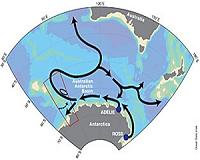| . |  |
. |
Leeds, UK (SPX) May 04, 2010 Scientists have discovered that changes in the amount of ice floating in the polar oceans are causing sea levels to rise. The research, published this week in Geophysical Research Letters, is the first assessment of how quickly floating ice is being lost today. According to Archimedes' principle, any floating object displaces its own weight of fluid. For example, an ice cube in a glass of water does not cause the glass to overflow as it melts. But because sea water is warmer and more salty than floating ice, changes in the amount of this ice are having an effect on global sea levels. The loss of floating ice is equivalent to 1.5 million Titanic-sized icebergs each year. However, the study shows that spread across the global oceans, recent losses of floating ice amount to a sea level rise of just 49 micrometers per year - about a hair's breadth. According to lead author Professor Andrew Shepherd, of the University of Leeds, it would be unwise to discount this signal. "Over recent decades there have been dramatic reductions in the quantity of Earth's floating ice, including collapses of Antarctic ice shelves and the retreat of Arctic sea ice," said Prof Shepherd. "These changes have had major impacts on regional climate and, because oceans are expected to warm considerably over the course of the 21st century, the melting of floating ice should be considered in future assessments of sea level rise." Professor Shepherd and his team used a combination of satellite observations and a computer model to make their assessment. They looked at changes in the area and thickness of sea ice and ice shelves, and found that the overall signal amounts to a 742 cubic kilometres per year reduction in the volume of floating. Because of differences in the density and temperature of ice and sea water, the net effect is to increase sea level by 2.6% of this volume, equivalent to 49 micrometers per year spread across the global oceans. The greatest losses were due to the rapid retreat of Arctic Sea ice and to the collapse and thinning of ice shelves at the Antarctic Peninsula and in the Amundsen Sea.
Share This Article With Planet Earth
Related Links University of Leeds Water News - Science, Technology and Politics
 Massive Southern Ocean Current Discovered
Massive Southern Ocean Current DiscoveredCanberra, Australia (SPX) May 03, 2010 A deep ocean current with a volume equivalent to 40 Amazon Rivers has been discovered by Japanese and Australian scientists near the Kerguelen plateau, in the Indian Ocean sector of the Southern Ocean, 4,200 kilometres south-west of Perth. In a paper published in Nature Geoscience, the researchers described the current -more than three kilometres below the Ocean's surface - as an important ... read more |
|
| The content herein, unless otherwise known to be public domain, are Copyright 1995-2010 - SpaceDaily. AFP and UPI Wire Stories are copyright Agence France-Presse and United Press International. ESA Portal Reports are copyright European Space Agency. All NASA sourced material is public domain. Additional copyrights may apply in whole or part to other bona fide parties. Advertising does not imply endorsement,agreement or approval of any opinions, statements or information provided by SpaceDaily on any Web page published or hosted by SpaceDaily. Privacy Statement |